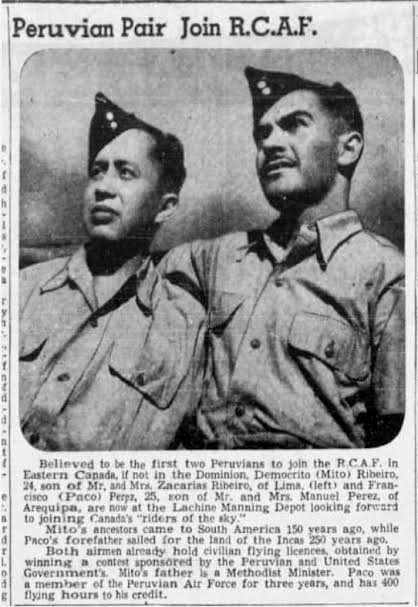The Remarkable Contributions of Peruvian Volunteers Democrito Ribeiro and Francisco Perez to the RCAF During World War II
 By Cap. Rey GARCIA-SALAS.- During the Second World War, the Royal Canadian Air Force (RCAF) welcomed two pioneering Peruvian aviators whose dedication and expertise significantly contributed to the Allied war effort and the foundational values of Canada. Democrito (Mito) Ribeiro and Francisco (Paco) Perez, believed to be among the first Peruvians to join the RCAF in Eastern Canada, embodied the spirit of international cooperation, shared commitment to freedom and justice, and played a pivotal role in shaping a prosperous Canada where human rights are respected.
By Cap. Rey GARCIA-SALAS.- During the Second World War, the Royal Canadian Air Force (RCAF) welcomed two pioneering Peruvian aviators whose dedication and expertise significantly contributed to the Allied war effort and the foundational values of Canada. Democrito (Mito) Ribeiro and Francisco (Paco) Perez, believed to be among the first Peruvians to join the RCAF in Eastern Canada, embodied the spirit of international cooperation, shared commitment to freedom and justice, and played a pivotal role in shaping a prosperous Canada where human rights are respected.
Democrito Ribeiro, born on March 4, 1919, the son of Mr. and Mrs. Zacarias Ribeiro of Lima, and Francisco Perez, born on July 27, 1918, the son of Mr. and Mrs. Manuel Perez of Arequipa, brought a wealth of aviation experience to the RCAF. Both aviators had obtained civilian flying licenses through a contest sponsored by the Peruvian and United States governments. Prior to joining the RCAF, Ribeiro and Perez had established themselves as skilled pilots, with Ribeiro holding a civilian flying license and Perez having 400 flying hours as a member of the Peruvian Air Force for three years. This extensive background laid a solid foundation for their roles in the RCAF.
Upon their arrival in Canada, Ribeiro and Perez were stationed at the Lachine Manning Depot in Montreal, where they awaited their deployment to various units within the RCAF. Ribeiro’s military career is chronicled through his service card, which details his postings and ranks throughout the war. Initially posted to the 5th Manning Depot on September 2, 1943, he advanced through various units, including the 3rd Initial Training School (ITS) on October 1, 1943. He obtained the rank of Leading Aircraftman (LAC) on December 10, 1943. Ribeiro continued his service at the 2nd Operational Training Unit (OEF) on May 25, 1944, the 8th Central Maintenance Unit (CMU) on July 20, 1944, and the 2nd Service Flying Training School (SF) on November 27, 1944, before retiring on February 2, 1945.
Francisco Perez’s service record mirrors the dedication and trajectory of Ribeiro. Starting his RCAF journey on September 2, 1943, Perez served in multiple training and operational units, demonstrating his versatility and commitment. His service card notes postings at critical training depots and maintenance units, reflecting the integral role he played in maintaining and advancing the operational capabilities of the RCAF. Perez’s assignments included the 3rd ITS, where he began his training on October 1, 1943. He progressed through the 2nd OEF on May 25, 1944, and the 8th CMU on July 20, 1944. Perez continued his service at the 2nd SF on November 1, 1944, obtained the rank of Pilot Officer on March 29, 1945, and was assigned to the 3rd Release Center (Rel C) on April 15, 1945, before retiring on May 5, 1945.
The contributions of Democrito Ribeiro and Francisco Perez extend beyond their technical skills and military achievements. Their presence in the RCAF during World War II highlights the importance of multiculturalism and international collaboration in achieving common goals. Their service is a testament to the strength that diversity brings to military efforts and the shared values that unite nations in times of global conflict.
Canada’s post-war prosperity and commitment to human rights were built on the foundation of such diverse contributions. The bravery and dedication of Ribeiro, Perez, and countless other soldiers from varied backgrounds have left an indelible mark on Canadian military history. They underscore the profound impact of their service in the fight for global peace and security, helping to shape a nation where diversity is celebrated, human rights are upheld, and the principles of justice and freedom are paramount.
As we reflect on the legacy of Ribeiro and Perez, it is essential to honor not only their sacrifices but also the contributions of all Latin American soldiers who served in the Canadian Armed Forces. Their efforts have been instrumental in building a Canada that stands as a beacon of hope, resilience, and respect for human rights, illustrating the power of unity and the enduring strength of a diverse and inclusive society.
Acknowledgement: I would like to thank historian Steven Dieter and PhD Michel Litalien for their support on this article.
The Latin American Soldiers in Canada Committee’s mission is to publicize the names and stories of Canadian-Latinos who were part of the Canadian Armed Forces.
